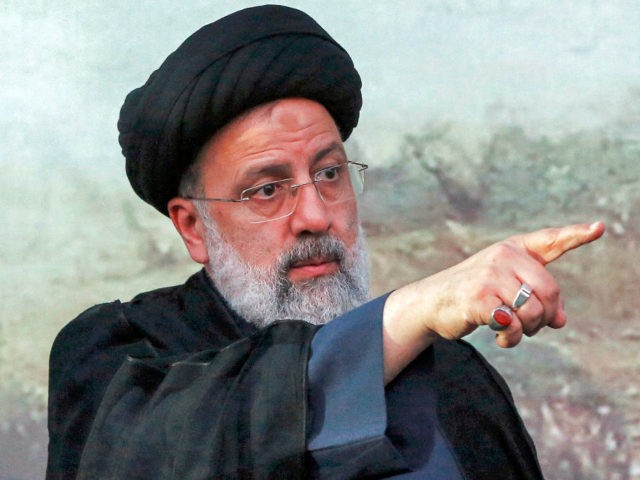Iranian President Ebrahim Raisi, a radical Islamist notorious for leading the massacre of up to 30,000 political prisoners in 1988, will visit China on Tuesday at Beijing’s invitation, the latter country confirmed on Sunday.
An Iranian president has not visited China in at least 20 years, an Iranian presidential aide confirmed on Monday.
Communist China is Iran’s largest trading partner and believed to be one of the prime purchasers of Iranian oil, despite global sanctions on the Islamist regime for its human rights atrocities and rogue nuclear program. China is itself a rogue nation loudly defiant of international law, currently engaging in genocide against multiple Muslim-majority ethnic groups that most of the Islamic world leadership has chosen to ignore or vocally support.
While China does not openly flout sanctions on the Iranian oil industry, “China is the main destination of illicit exports by Iran,” White House special envoy for Iran Robert Malley said in January.
The Chinese Foreign Ministry announced on Sunday that Raisi would be in China from Tuesday to Thursday, a brief trip reportedly organized after Raisi and Chinese dictator Xi Jinping met at the Shanghai Cooperation Organization (SCO) conference held in Uzbekistan in September. The SCO is a China-led economic initiative meant to increase Beijing’s leverage in the economies of its neighbors.
China’s state-run Global Times propaganda newspaper reported, citing the government of Iran, that Raisi and Xi will likely sign multiple “cooperation agreements” and Raisi would also make time for meeting business leaders in pursuit of more economic deals.
“China is Iran’s largest trade partner, IRNA said, citing 10-month statistics from Iranian customs authorities. Iran’s exports to Beijing stood at $12.6 billion, while it imported $12.7 billion worth of goods from China,” the Global Times observed.
Iran is a member of China’s Belt and Road Initiative (BRI), a sprawling global infrastructure plan in which China offers predatory loans to poor countries that it later uses to undermine their sovereignty. The BRI has had particularly disastrous results in impoverished African countries, such as Zimbabwe and Rwanda, as well as the bankrupted Southeast Asian nation of Sri Lanka.
In December, China negotiated a BRI deal with Iran’s geopolitical rival, Saudi Arabia, that appeared to allow the latter country to partake in building infrastructure projects in the initiative, as opposed to taking out predatory loans for projects within Saudi Arabia. In a joint statement during a visit by Xi to Riyadh, the two governments announced a plan “enhancing the Kingdom’s location as a regional center for Chinese companies in producing and exporting the products of energy sector, as well as the joint investment in energy projects in the countries of the region and energy consuming countries in Europe and Africa.”
While regularly menacing Saudi Arabia, the Iranian government has not publicly expressed any reservations about Saudi Arabia’s participation in the BRI or China’s deepening ties with that country. An Iranian Foreign Ministry spokesman, discussing Raisi’s upcoming visit on Monday, insisted that the “highest political will” exists “to expand bilateral ties based on mutual interests.”
Raisi himself – writing in a column for the official newspaper of the Chinese Communist Party, the People’s Daily – compared the BRI to the Ancient Silk Road’s service of connecting China to the Middle East and insisted that the bilateral relationship had a major role to play in undermining Western human rights-related sanctions on rogue states.
“As two living and dynamic human civilizations, Iran and China were connected to each other via the historic Silk Road, and ascertained the fact that prosperity and happiness as desirable popular goals can only be achieved through interaction and cooperation,” Raisi wrote.
“Both countries view unilateralism and coercive measures, including oppressive sanctions, as the main root of the crises and insecurity,” Raisi continued, “and call for collective efforts in order to obtain genuine multilateralism, besides worldwide justice, international equality and a balanced world order.”
“The basic interests and rights of nations, including the right to development, are non-negotiable. Any attempt by arrogant powers to politicize issues and consequently deprive nations, at the expense of exploitation of international mechanisms, is condemned,” Raeisi asserted.
Celebrating China as a “friendly power,” Raisi praised the Communist Party’s alleged rejection of “colonialism” – which it is currently undertaking in occupied Tibet and East Turkistan, as well as the seized territories in the South China Sea – and offered China Iran’s “political independence, military might to ensure security, educated manpower, low cost of production, energy reserves, transit location and industrial infrastructure.”
According to Iranian propaganda outlet PressTV, the basis of the exchange of these skills is a 25-year “comprehensive strategic partnership agreement” that Iran and China signed in 2021, but never engaged in any planning to implement.
Notably absent from public statements about the upcoming visit is any discussion of Iran’s oil industry. China nominally claims to comply with, and vocally condemns, international oil sanctions on Iranian oil, but multiple exposés have revealed that China is likely purchasing Iranian oil through a third party. In January, Bloomberg News estimated that China was buying the bulk of its Iranian oil through Malaysia.
“The Persian Gulf country’s oil exports climbed to about 1.3 million barrels a day in November, and last month held near the highest in four years,” Bloomberg reported. “The extra Iranian barrels appear to be bound for China, the world’s biggest oil importer, under the banner of shipments from Malaysia. Beijing’s intake from the Asian nation surged to a record in December, figures from China’s customs administration show.”
Bloomberg noted that the amount of oil China is importing from Malaysia is far greater than Malaysia’s export capacity, “almost triple the average daily crude output from the Southeast Asian nation over the first nine months of 2022.”
Follow Frances Martel on Facebook and Twitter.

COMMENTS
Please let us know if you're having issues with commenting.